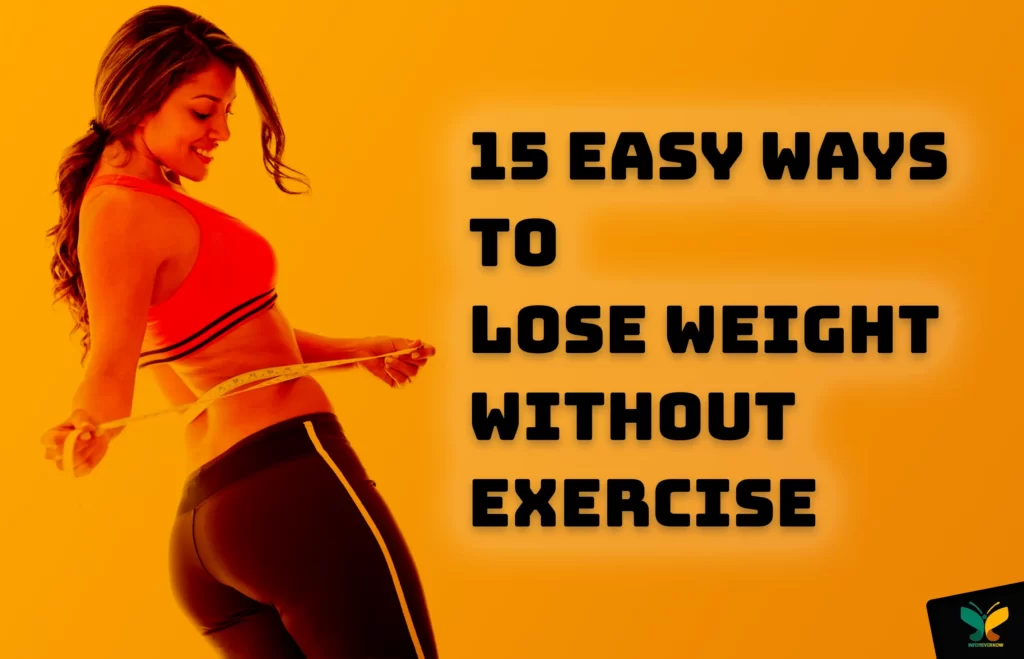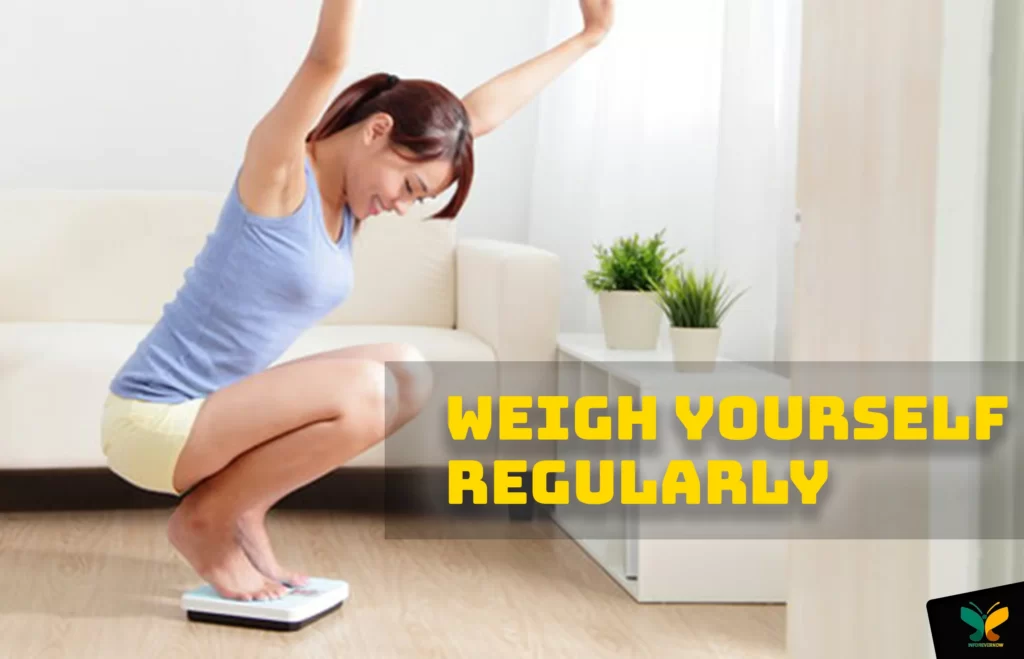15 Easy Ways to Lose Weight Without Exercise, Gym or Dieting
by Singh · Published · Updated

Lose weight without exercise! Is that possible? Yes, It is. Here we will share how.
If you don’t enjoy going to the gym, starting your weight loss journey may seem difficult. Despite the fact that physical activity has numerous beneficial effects on your health, it is only one factor in weight loss.
Fortunately, there are many of alternatives to lifting weights or running on a treadmill if you can’t make it to the gym and want to lose weight in a reasonable amount of time.
Regardless of the motivation behind your decision to begin a weight loss program, making a few small adjustments to your daily routine can support you in your quest for better health, especially if you’ve previously struggled to lose weight.
Table of Contents
ToggleLose Weight Without Exercise
You should first have the following in mind if you wish to lose weight without exercising:
– Consider your long-term weight objectives and the weight you intend to maintain on average over the long term.
– Instead of checking your weight every day, assign yourself some longer-term goals. For example, instead of checking your weight every day, check it every two weeks or once a week.
– Instead of trying to copy what other people are doing, keep a realistic weight reduction goal that will work for you.
– Consider your entire lifestyle and identify any areas where you may make adjustments for the better to lose weight without exercising while still assisting you in maintaining a healthy weight.
How to lose weight without exercise?
Here are 15 very easy-to-follow, effective, and simple ways in which you can lose weight without exercise:
1. Drink Lots of Water

To lose weight without exercise, you must stay hydrated. When they are thirsty, many people eat instead of seeking a drink because they mistake the indicators of dehydration for hunger. Dehydration can be avoided by consuming large amounts of water throughout the day.
You may find it beneficial to have water, especially before meals. The majority of the time, you will eat fewer calories when you drink a full glass of water before meals. Even more weight loss can be achieved by substituting water for sugary drinks.
2. Prepare More Meals at Home
A wonderful method to increase the amount of nutrient-dense foods in your diet is to prepare your own meals at home. Additionally, it might support weight loss.
In fact, studies show that those who cook more meals at home tend to weigh less than those who frequently eat out or consume prepared foods.
Meal planning may be linked to a better diet and a lower risk of obesity.
Consider keeping a supply of products that are high in nutrients and trying out a few new dishes each week.
3. Avoid Sweets, Unhealthy Snacks, and Other Unhealthy Foods
If you have attempted dieting for weight loss, it may be among the most frequently uttered statements you have encountered, and for good reason. One of the main contributors to obesity in the US is an excessive sugar intake.
Although consuming junk food and sweets might be fun, these foods are frequently rich in calories, added sugar, and trans fat, so eliminating them from your diet can have a big influence on weight loss and general health.
Thankfully, cutting back on added sweets and processed meals with saturated fats has many other advantages besides only helping you lose weight without exercise. These dietary modifications may promote healthier skin, lower cholesterol, and help guard against other chronic illnesses.
4. Take Your Time to Chew Your Food
Chew your food for a longer amount of time each time you eat. By doing so, you’ll not only be able to enjoy the flavors better but also consume less food. You’ll be inspired to eat less food while still enjoying it as a result. When you chew food completely and for a long period, it aids in normal digestion and facilitates absorption by your body.
It’s probable that if you eat while watching television, you won’t know when you’re full and end up consuming more food than you should. Even if you are dining alone, savor your food and take your time.
Alternately, make mealtimes a family activity without any interruptions from screen time if you are at home.
5. Get Plenty of Sleep

You need enough sleep to achieve all of your health and fitness goals. Sleep is essential for losing weight. For instance, one study discovered that those who underwent a 14-day calorie restriction lost less body fat when they slept for 5.5 hours as opposed to 8.5 hours. This is most likely caused by undersleeping, which causes your body to produce more of the hunger hormone ghrelin.
Hormones that control hunger and satiety might be upset by a lack of sleep, which increases calorie intake. An ideal amount of sleep each night is between seven and eight hours.
6. Limit Alcohol Consumption
Limiting your use of beer, wine, and spirits will help you lose weight without exercise because alcohol consumption can cause inflammation in the body and has also been connected to overeating.
Reducing alcohol consumption has been associated with weight loss in overweight people, according to studies. Nevertheless, if you’re trying to lose weight, it’s important to limit your alcohol use as it may also be a risk factor for obesity.
7. Manage Stress

If you’re under a lot of stress, your eating habits will probably suffer. A successful method of weight loss without exercise is to effectively manage any stress you may be experiencing. Stress and unfavorable emotions have been linked to overeating and decreased physical activity, two important risk factors for weight gain, according to a 2017 study.
Cortisol levels can rise as a result of chronic stress, which Best claims can result in an increase in hunger and weight gain. Use methods to reduce stress, such as yoga, deep breathing, or meditation.
8. Eat Plenty of Protein
Appetite is significantly influenced by protein. It can help you feel more satisfied after eating, decrease appetite, and consume fewer calories. This might be as a result of protein’s impact on a number of hunger- and fullness-related hormones, such as ghrelin and glucagon-like peptide-1.
One research of 105 participants found that those who adhered more closely to a high protein diet than those who followed a regular protein diet significantly lost more weight. If you typically have a breakfast of grains, you might want to think about upping the protein in your diet.
According to a study, individuals who ate a high protein breakfast of eggs and toast felt less hungry and consumed fewer calories later in the day than those who had cereal or a lower protein breakfast. Foods high in protein include chicken breasts, salmon, Greek yogurt, lentils, quinoa, and almonds, to name a few.
9. Weigh Yourself Regularly

Some people find it helpful to hold themselves accountable and has been shown to improve weight control to use a scale to monitor progress each week.
Keeping track of your weight over time can also help you change your meal plan and calorie objectives if you are unsure of how many calories you should be consuming each day to maintain your weight reduction goal.
Remember that your weight can vary by a few pounds depending on the time of day, your level of hydration, and how much you exercise. For better accuracy, try to weigh yourself at the same time every day or week.
10. Focus on Whole Foods
Weight loss is one of the many potential health advantages of eating a balanced, whole-foods diet. Whole foods are nutrient-dense and encourage fullness.
When you concentrate on whole foods, you could inadvertently consume less of the added sugars, processed meals, and simple carbohydrates that can cause weight gain. Here are some examples of whole food sources for each of the macronutrient groups that you might want to try including in your diet.
Authentic Carbohydrates
Pay special attention to legumes, quinoa, whole grains, oats, potatoes, fruits, and vegetables.
Whole proteins
Chicken, fish, eggs, plain Greek yogurt, grass-fed beef, and tofu are some examples of these food sources.
Whole Fats
Include as many different things as you can, such as avocados, almonds, and olives. The majority of animal proteins come from entire sources of fat.
11. Fill Half Your Plate With Veggies
Take a moment to study the food servings on your plate the next time you sit down to a meal. Are vegetables at least half of the meal? Increased consumption of low-calorie, nutrient-dense vegetables can help you feel full without packing on the pounds.
Filling up on vegetables increases your intake of satiating fiber while consuming little calories. Additionally, it reduces the amount of area left for higher-calorie meals and lowers your meal’s overall calorie count. Better better, start with the vegetables so that you eat less of the heavier food by default.
12. Don’t Eliminate Junk Food - Just Eat Less of it
It is as easy as it sounds. You can reduce your intake without going against your inclinations if you consume a little bit less of the meals with the highest caloric content. You don’t have to completely stop eating potato chips, but if you usually eat two bags per day, you should cut back to one bag each week. Just this one modification might be sufficient to generate a calorie deficit that finally influences the scale.
13. Reevaluate Your Morning Coffee

It is all too simple to unknowingly ingest 500 calories or more with your morning coffee in a time when there appears to be a Starbucks on every corner. Consider switching to a cup of coffee (without additional sugars) at home if you frequently buy a latte on the way to work. Over time, doing so might help you save a lot of money and calories.
14. Watch Your Portion Sizes
Your portion sizes may be the reason why you haven’t seen progress on the scale if you’ve struggled with your weight despite eating a healthy, whole-food diet.
Despite the fact that it may appear clear, nutritional information on items is occasionally inaccurate or difficult to understand. Focusing on how much food is on your plate is crucial because research has shown that eating huge portions might result in weight gain. Learning to independently estimate portion sizes when trying to lose weight can help people who suffer with obesity.
15. Stand, Stretch, & Walk During the Day
Standing up frequently throughout the day, taking more steps, or even stretching have all been connected to greater weight reduction. While it may seem trivial, standing burns more calories than sitting, and over time, these calories can mount up.
Walking and other daytime activities have been proved to be beneficial for general health and can significantly aid in weight management over the long term by keeping you active and raising your heart rate.
Some Final Words
You should heed the advice of your healthcare practitioner if they have advised you to reduce your physical activity. However, there are several health advantages if you can continue to move while you are losing weight. For instance, exercise can enhance your energy levels, elevate your mood, and aid with weight management.
We hope you enjoy our blog about 15 easy way to lose weight without exercise. Plz share your comments so that we can improve our work. Till the time eat healthy keep healthy.









